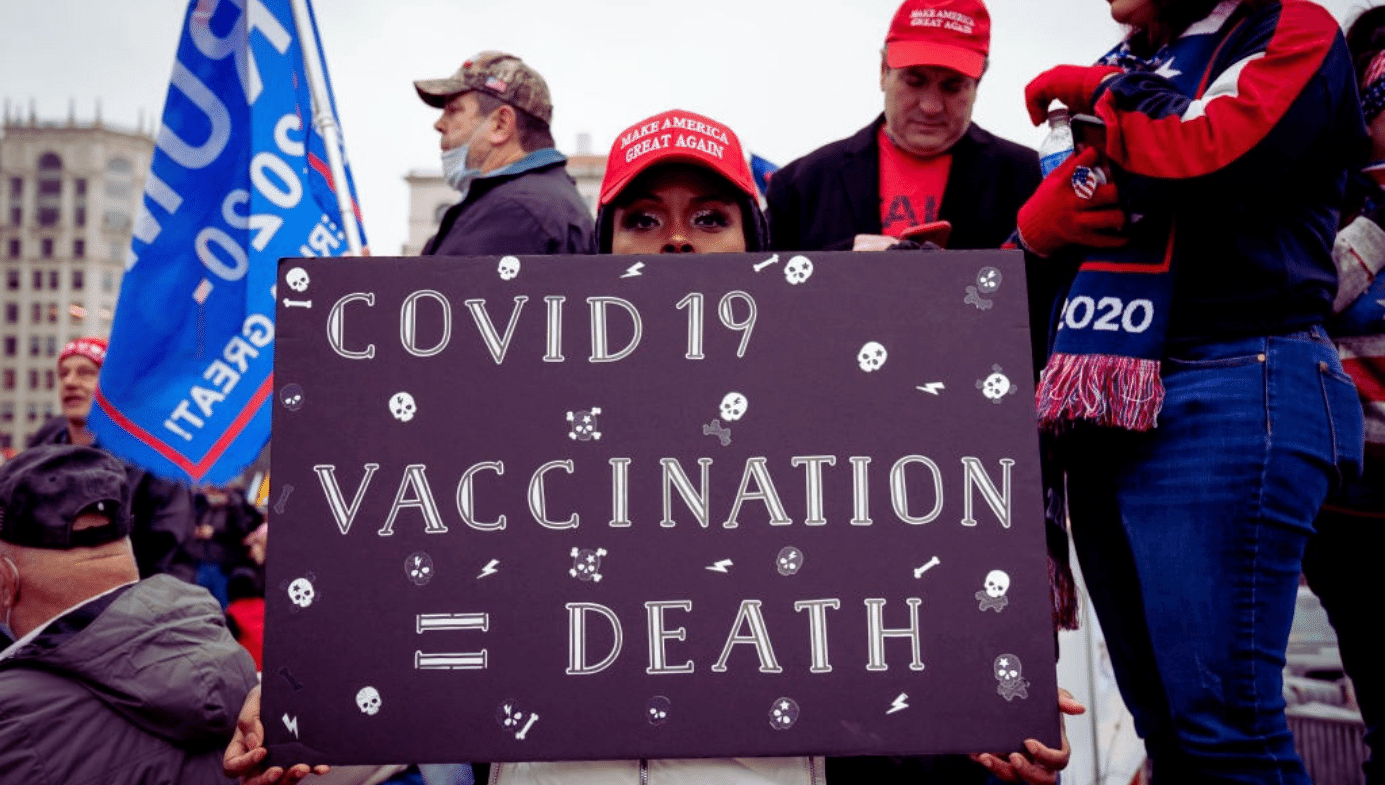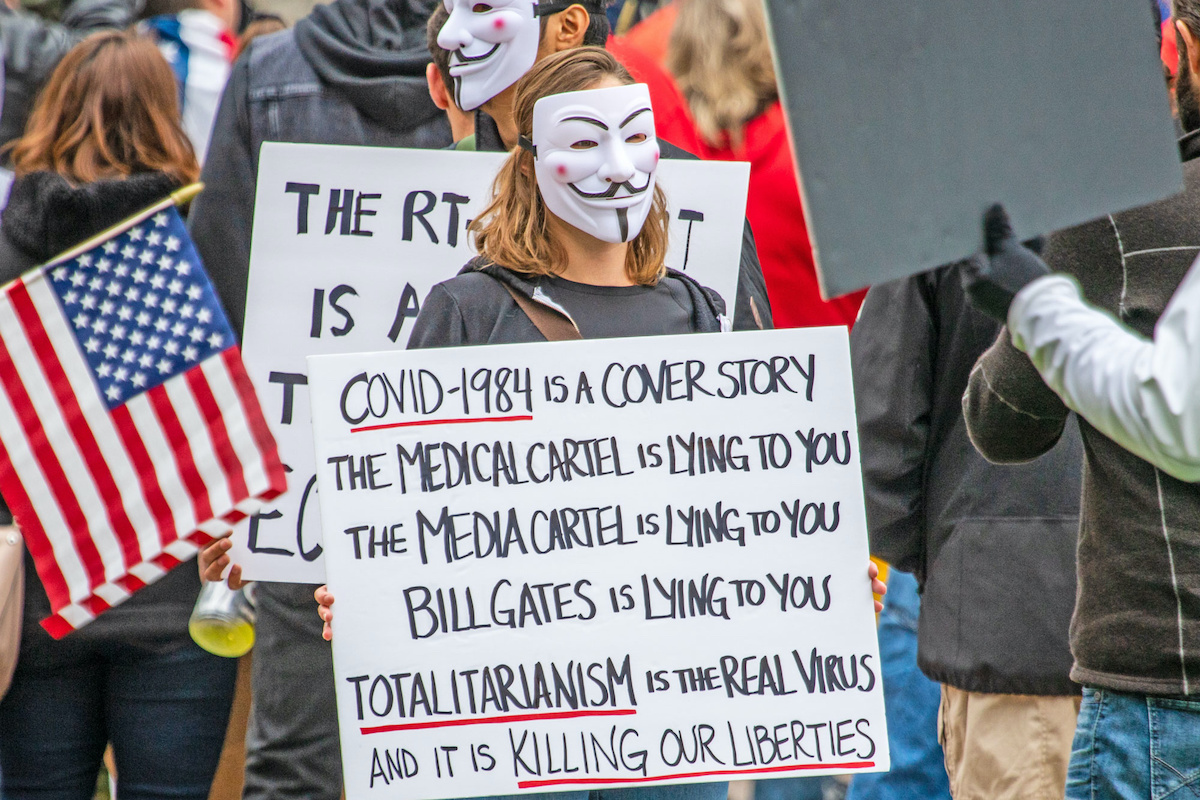COVID-19
Understanding the Motivated Reasoning of Anti-Vax Refuseniks
Vaccine refusal also correlates with a feeling of alienation from the wider culture—what sociologists call “anomie.”

COVID has hospitalized 6.2 million Americans, killed at least 640,000 (the true count may be 800,000), and caused permanent cardiovascular, neurological, and other health problems in many others. Thankfully, the available vaccines are highly effective in preventing hospitalization and death.
And yet, about 20 percent of Americans still insist that they will never get a COVID-19 vaccine. Their reasons are, variously, that the vaccine is experimental and thus risky to take, is making people sick or may have long-term health effects, is unnecessary because they won’t get seriously ill from COVID, or is ineffective because some people who got the jab are catching COVID anyway. In fact, these vaccines have been tested on more people than any vaccine in history; vaccines typically do not produce side effects months or years later (false claims that vaccines cause autism, remember, were sourced to one fraudulent study); and although a very small number of people have indeed experienced serious medical side effects, the chances of getting seriously ill or dying from COVID itself present a risk that is orders of magnitude more deadly.
Vaccine refuseniks typically source their claims to fringe dissidents within the medical field (including the so-called “disinformation dozen"), who provide anti-vaccine talking points that can sound sophisticated and scientific. And when confronted with the fact that these dissenters are vastly outnumbered by far more reputable experts, anti-vaxxers are inclined to accuse mainstream public-health experts of being corrupted in some way by government or corporate agents with a nefarious agenda. But I am yet to see a convincing explanation as to how such suspicions are consistent with the fact that the world’s leading medical and scientific experts, not to mention almost 100 percent of physicians, couldn’t wait to get the jab themselves.
Since the weight of actual evidence is so plainly on the pro-vaccination side, it’s worth asking why some people choose to put their faith in a handful of medical oddballs and their far-fetched theories. These doubters are literally putting their lives at risk: The Delta variant is almost as contagious as chickenpox, and the unvaccinated are 29 times more likely to be hospitalized than those who receive a vaccine.

It is obviously true that many of us are prone to irrational or superstitious forms of thinking. Some Americans insist that they don’t need the vaccine because God will protect them, or that their health is assured so long as they avoid “unnatural” substances (such as vaccines). Yet this logic tends to be selectively applied: Many of the same people who make these claims often exhibit little hesitation in regard to other medications and preventative therapies, including non-COVID vaccines and other “non-natural” substances.
When people refuse to change their minds, even in the face of overwhelming evidence, they usually are exhibiting what psychologists call “motivated reasoning,” typically on an unconscious level. They begin with a preconceived view (most COVID refuseniks were suspicious of the vaccines even before any data was available), and are motivated to adopt forms of reasoning that reinforce their existing view and thereby pre-empt cognitive dissonance.
This is part of the well-observed psychological phenomenon by which we all exhibit bias toward any theory or information source that confirms our beliefs, while finding pretexts to discount or dismiss sources and evidence that challenge those beliefs. Vaccine refusal tends to correlate with lower educational levels, a disinclination toward analytical reasoning, cognitive and personality styles given to motivated reasoning, and a belief in conspiracy theories. (These conspiracy theories are basically “stories of power,” as one author has put it—“the secret power of a particular group, and the new power of the people who have come to see through their deception.”)
Vaccine refusal also correlates with a feeling of alienation from the wider culture—what sociologists call “anomie.” This alienation acts as a shield against new information. Psychologists have developed tried-and-true techniques to help people overcome their biases and preconceptions. But for these techniques to be effective, the individual must first be open to the idea of changing his or her mind. That’s something that refuseniks simply don’t want to do.
Even before vaccines became available, polls consistently showed supporters of Donald Trump, and conservatives more generally, to be less likely to wear masks or limit their social activities. For many, flouting public-health advice became a point of pride—as people now often invest their sense of self in their political beliefs. A University of Montana study showed that conservatives readily associated the idea of taking COVID seriously with the need for more government controls and less personal freedom. And so they were motivated to adopt an understanding of the pandemic’s risk level that didn’t require them to accede to policies inconsistent with their political preferences.
Many refuseniks complain that the push for the vaccine, much like lockdowns and mask requirements, originates with the liberal impulse to control citizens’ behaviors. But even if one acknowledges that there may be a grain of truth to that, what is the harm in being temporarily “controlled” for one’s own good? Surely it’s worth compromising one’s political principles as a means to safeguard our most precious asset—i.e., our lives, and those of our loved ones.
This brings us to a concept that psychologists refer to as secondary gain—the benefit people derive when they act against self-interest in a way that satisfies some deeply felt psychological need. Secondary gain is a common motivation that we all engage in from time to time on a personal level—for example, the child who spitefully refuses to do schoolwork. But it can rise to the level of political force when large numbers of people engage in de facto self-harm as a means to spite their own government.

In the United States, the most vaccine-skeptical demographics include the rural working class and evangelicals without a college degree. Many members of these groups have been left behind economically, and feel alienated culturally and politically. Resisting the vaccine can give them a sense of agency, control, and even dignity, as it’s one of the few things they can do to assert their autonomy in a way that the wider society will actively observe. The fact that their vaccine aversion is a source of anger and frustration among the rest of the country is actually a plus: These negative responses constitute evidence that they are being noticed by the elites; that what they do matters.
Unconscious motives and defenses are a tough nut to crack, even for trained psychologists. In the case of vaccine skeptics, the best we can do in the short term is to simply avoid exacerbating the anomie and sense of persecution that originally gave rise to the unmet psychological needs at play—needs that are so strong that they cause refuseniks to risk their own health. And we should remember, too, that we all hunger for dignity, self-respect, and a sense of control over our lives. Even as we acknowledge that vaccine refuseniks are making the wrong choice, we should try, in good faith, to understand why they’re making it.






